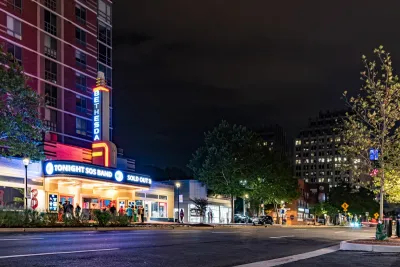The county hasn’t acted on the recommendations of its own Nighttime Economy Task Force, which suggested ways to improve the business climate for restaurants and nightclubs to draw younger residents to the region.

In a piece for Greater Greater Washington, Weston Henry describes how Montgomery County’s business regulations are stifling the development of nightlife in the county.
According to Henry, the Nighttime Economy Task Force, formed in 2013, published a series of recommendations to revitalize the county and bring more residents and businesses to the area. “And yet, here we are eleven years later, with no dance clubs, few late-night spots, and little evidence to suggest that the perception of the county as a social desert for singles has changed.”
Henry blames this on the Board of License Commissioners, which “is solely responsible for creating the county’s alcohol rules and regulations, and have created a series of regulations seemingly designed with the sole intention of preventing any venue catering to young, single, or recently transplanted people to open in the county.” Henry notes that restrictions on restaurants and bars such as requiring that 40 percent of income be earned through food sales, prohibiting dancing in venues without a special license, and requiring a full menu of food are preventing businesses from operating successfully. While the task force recommended a new social venue license, it was never created.
While some local officials say the younger work force will move back to the county after they have kids, this belief, Henry writes, “is a terrible economic strategy. It contributes to our massive labor shortage, which forces employers to eliminate positions, as the county itself did last year, or move to where they can find people to fill these positions.”
FULL STORY: Where’s the nightlife in Montgomery County?

National Parks Layoffs Will Cause Communities to Lose Billions
Thousands of essential park workers were laid off this week, just before the busy spring break season.

Retro-silient?: America’s First “Eco-burb,” The Woodlands Turns 50
A master-planned community north of Houston offers lessons on green infrastructure and resilient design, but falls short of its founder’s lofty affordability and walkability goals.

Delivering for America Plan Will Downgrade Mail Service in at Least 49.5 Percent of Zip Codes
Republican and Democrat lawmakers criticize the plan for its disproportionate negative impact on rural communities.

Test News Post 1
This is a summary

Test News Headline 46
Test for the image on the front page.

Balancing Bombs and Butterflies: How the National Guard Protects a Rare Species
The National Guard at Fort Indiantown Gap uses GIS technology and land management strategies to balance military training with conservation efforts, ensuring the survival of the rare eastern regal fritillary butterfly.
Urban Design for Planners 1: Software Tools
This six-course series explores essential urban design concepts using open source software and equips planners with the tools they need to participate fully in the urban design process.
Planning for Universal Design
Learn the tools for implementing Universal Design in planning regulations.
EMC Planning Group, Inc.
Planetizen
Planetizen
Mpact (formerly Rail~Volution)
Great Falls Development Authority, Inc.
HUDs Office of Policy Development and Research
NYU Wagner Graduate School of Public Service




























